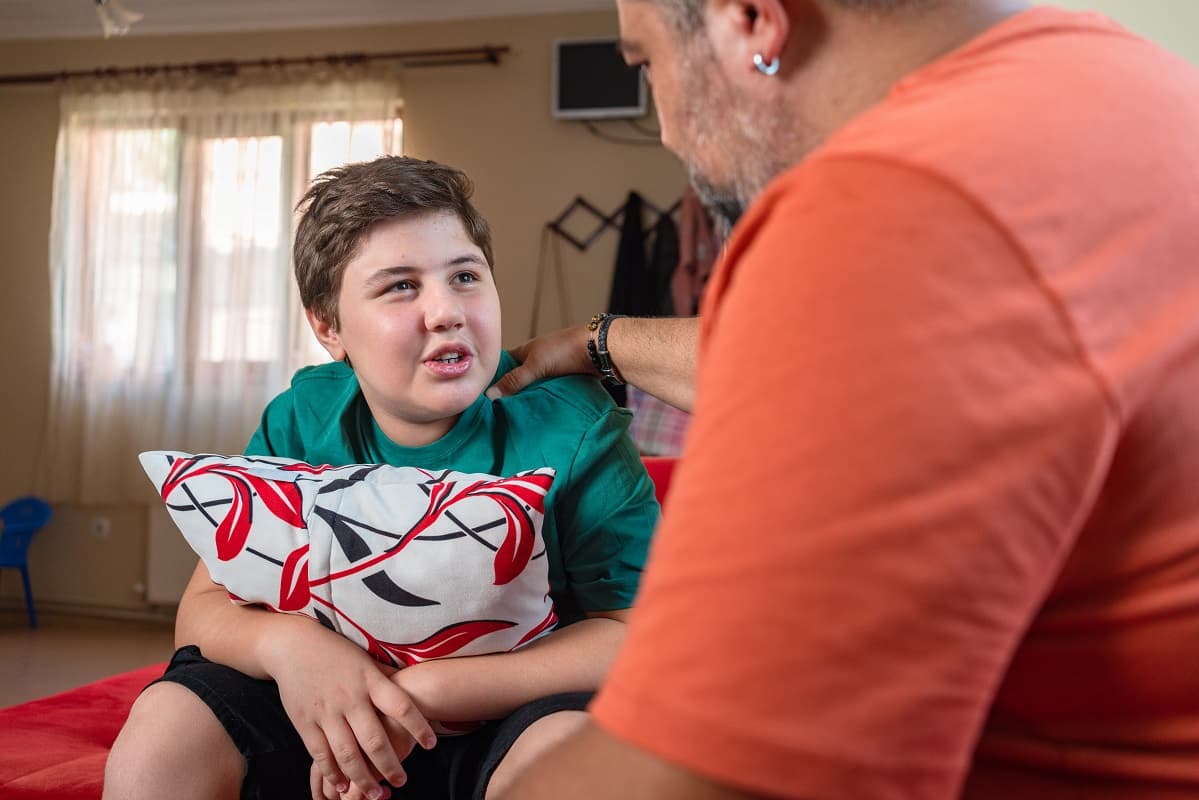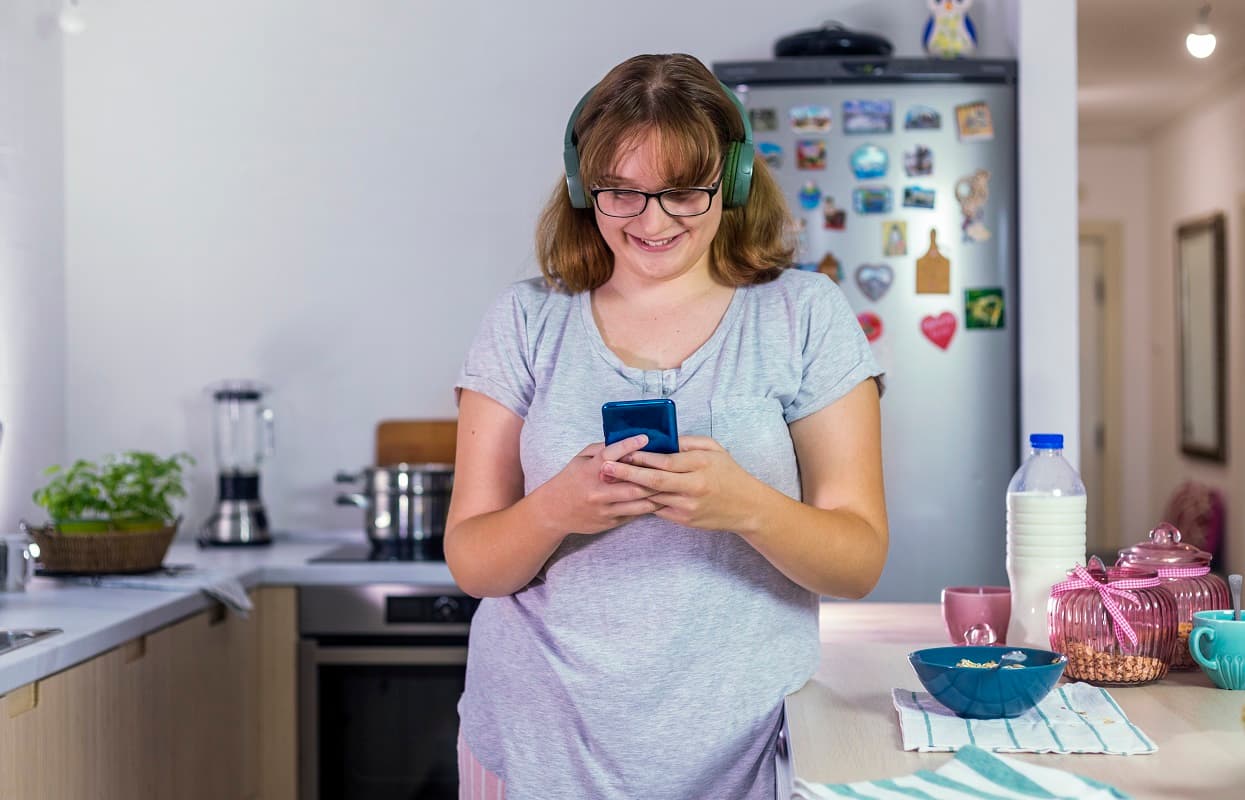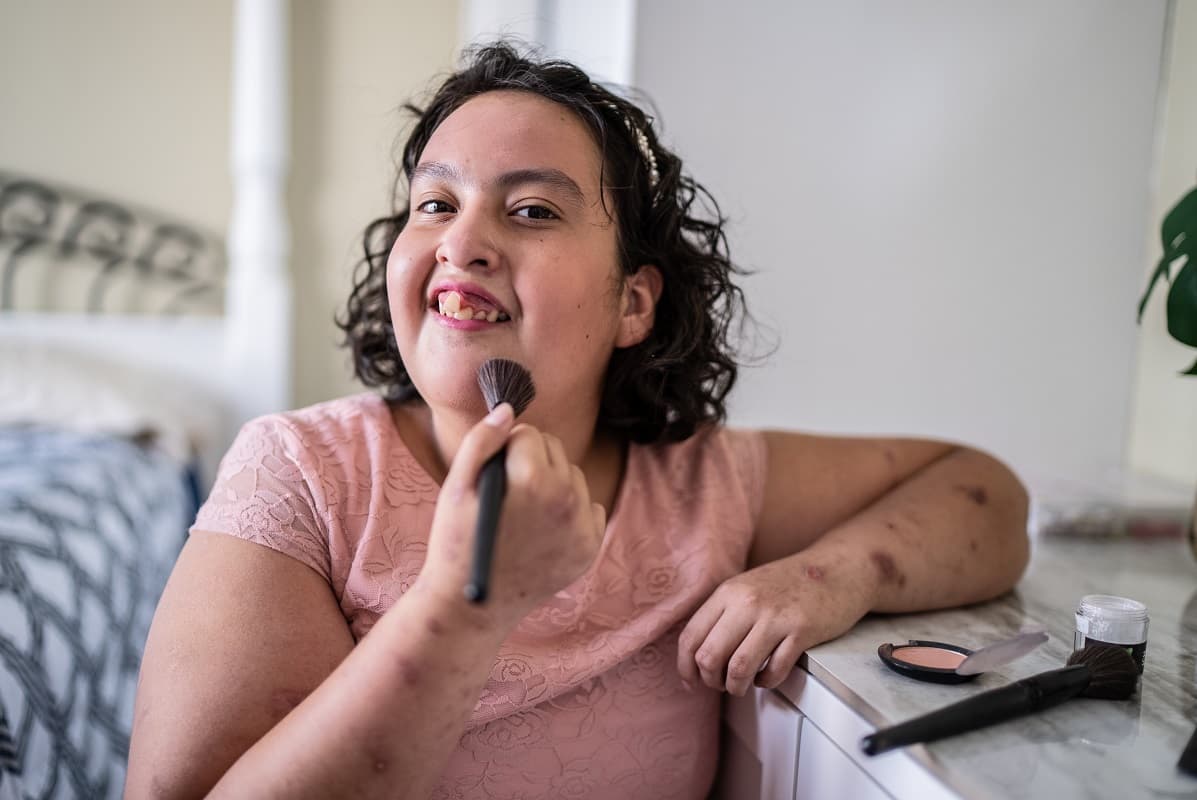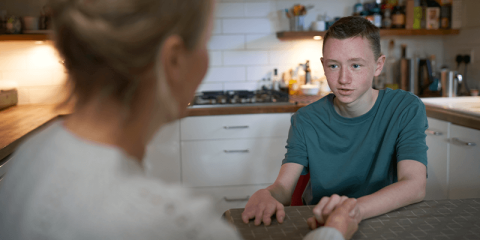Body image is closely connected to our sense of self, and our physical and mental health. So the more you can encourage your child to be kind to themselves and to feel comfortable in their own skin, the better. And the good news is, there are lots of things you can do to support them to accept the way they look, and to counteract the influences that affect their body image.
How to help teens feel more positive about themselves
In this video psychologist Dr Lynne Taylor shares advice for parents to help teens feel more positive about themselves.
Tips for helping teens accept the way they look
Tip #1: Be a role model

It’s not just celebrities and influencers who can affect how your teen sees themselves. Although they might not want to admit it, you also have a lot of influence. So have a think about how you feel about your own body and try to show you appreciate it in front of your teen.
For example, try to avoid having a go at yourself for eating certain foods, talking about dieting, criticising your body or complaining about ‘having to do exercise’. This isn’t always easy – if you need some support, you can find tips for improving your body image on the Mental Health Foundation website.
Tip #2: Encourage them to limit the amount of time they spend online

One of the best ways for teens to avoid being bombarded by unrealistic images of ‘perfect’ bodies is to limit the amount of time they spend online. We know this is easier said than done and may meet with resistance, but there are things you can do to help them with this.
You could try suggesting that you spend more ‘offline’ time together as a family, doing something nice like watching a movie (without second screening), having a meal together where everyone (including you) puts their phones away, or doing something active outdoors.
You could also suggest they turn off their notifications, so they’re not being constantly dragged back to their screens. They could also use the functionality provided by apps to limit their time, like Instagram’s reminder to take breaks and set a daily time limit.
Tip #3: Shift the focus from the outside to the inside
If we’re always going on about how people look, it helps your child think that our outward appearance is more important than who we are inside. So when you’re talking about friends, family, celebrities, fictional characters or anyone else, try and focus on the whole person rather than just what they look like. Try talking about their qualities and personalities instead, such as how they are kind, talented, funny or loyal.
Tip #4: Remind them to accept their body and treat it well
The media is always telling us how we ‘should’ look and what we ‘should’ be doing to achieve this, like dieting exercising or wearing certain clothes. And all this can make us feel that we’re not good enough, or not trying hard enough. But our bodies are amazing! So try talking to your child about all the things their body can do – from walking to dancing, drawing, to playing football. The more they appreciate what their body can do, the more they’re likely to feel good about it and look after it.
Tip #5: Take care with compliments
There’s nothing wrong with complimenting your child on how they look – everyone likes to be told they look nice. In particular it’s good to compliment them on their style choices, for example, how they’ve done their hair or what they’re wearing, as this is something they can control.
However, it’s important to make sure you balance this out with plenty of supportive comments about who they are and what they’re doing – are they kind, funny, thoughtful, hard-working, generous, creative, a loyal friend? This will help them build up a self-image that isn’t just based on their looks, but on who they are inside.
Tip #6: 10 things I love about you

One way to boost your child’s confidence is to suggest that every time someone says something nice about them as a person, or every time they think of something about themselves they like, they jot it down. This could be in a special notebook, on a slip of paper they can put in a jar or box, or in an app or notes folder on their phone. You could start them off with a few suggestions yourself – can you list 10 things you love about them? You could send them messages to their phone to let them know how much you appreciate them.
Don’t be discouraged if your teen doesn’t seem to appreciate it – it is worth the effort. And if they’re having a difficult day, looking through the notes could remind them of all their good qualities.
You could also suggest they stick these messages around their mirror, to encourage them to see the whole person, not just the outer reflection.
Tip #7: Don't fall into the comparison trap
Try not to compare your teen to their siblings or to other people’s children – even if the comparison is favourable. This can encourage them to compare themselves to others, either people around them or online, and can lead them to feeling they’re not good enough.
Tip #8: Let them be themselves (everyone else is already taken!)

Young people can feel a lot of pressure to conform – to be like their friends, or like the popular kids, or like the people they see online. So it’s important to help them feel that the best person they can be is themselves. Let them experiment with clothes and hairstyles and try out different hobbies and activities so they can find the things they genuinely like – even if they do make a few mistakes along the way!
Tip #9: ‘In a world where you can be anything, be kind.’
Yes, it’s a bit cheesy, but it’s also true: being kind is a fantastic way to make ourselves and other people feel good.
Self-compassion – being kind to ourselves and treating ourselves as we’d treat a best friend – is one of the best ways to protect ourselves from disliking our own bodies. And the kinder we are to other people, the easier it is to be kind to ourselves.
So try to encourage your child to be kind to and about their friends, and themselves, and to avoid friends who aren’t kind to them, if they can.
Tip #10: Help them challenge harsh self-talk

Have a chat to your child about that negative voice we all have in our heads and encourage them to challenge it. Having negative thoughts is totally normal, but it’s important not to let them take over.
So when they catch themselves thinking something mean about their body, suggest that they ask themselves if they’d speak to a friend like that? You could also suggest they think about why they have that thought. Where does it come from? Is there any evidence to back it up? This will help them confront negative thoughts and reduce their impact.
Tip #11: Have a social media spring clean
Encourage them to delete any apps that don’t make them feel good about themselves, to unfollow anyone who makes them feel they’re not good enough and to start following people who make them feel good and who talk about the hobbies or interests they like. Our tips for getting the most out of social media have more suggestions.
Tip #12: Encourage them to tune in to their body
Lots of young people use health apps to monitor the number of steps they take or what they eat. But these can make us anxious or stressed if we can’t keep to the targets we set ourselves. So try and discourage your teen from using these.
Instead of focusing on how many calories they’ve consumed or how many steps they’ve walked, encourage them to tune into how they’re feeling and what they need to do to feel good about themselves. This could be doing an activity that makes them happy or getting some fresh air, or it could be hanging out with friends or even sleeping!
You can find out more about how to check in with your body on the BodyWHYS website.
 Activities & Play
Activities & Play Behaviour
Behaviour Childcare
Childcare Development & Growing Up
Development & Growing Up Family, Friends & Relationships
Family, Friends & Relationships Feeding Your Baby
Feeding Your Baby Food & Eating
Food & Eating Health & Safety
Health & Safety Mental Health & Wellbeing
Mental Health & Wellbeing Money & Work
Money & Work Online Behaviour & Safety
Online Behaviour & Safety Pregnancy & First Days
Pregnancy & First Days School & Education
School & Education Sleep
Sleep









 Behaviour
Behaviour
 Sleep
Sleep